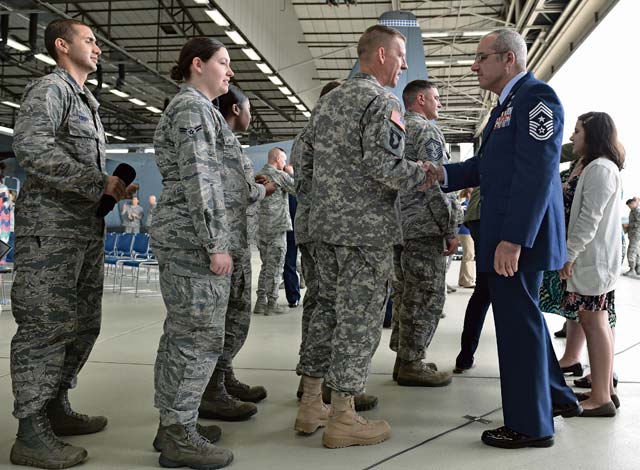
Core values, air power and followership are some things an Airman might think of when it comes to an enlisted leader with 28 years of service.
Ramstein Airmen said goodbye to Chief Master Sgt. James A. Morris, 86th Airlift Wing command chief, May 23 after his retirement ceremony.
During the ceremony, a crowd of more than 400 Airmen, friends and family celebrated the command chief’s career. Morris said spending the last moments of his career with the people who helped make his career better made the celebration that much greater.
“The people I’ve worked with have kept me in the Air Force for this long,” Morris said. “I joined to only stay in for four years.”
Morris had taken a leave of absence previously from a civilian job to join the Air Force. After being stationed in Alaska and Germany, being in the Air Force became exciting to him, Morris said.
“I was traveling around the world, meeting new people and seeing things I would’ve never seen if I had stayed home,” Morris said. “It kept me going all this time.”
Out of all the service members Morris met throughout his career, he still looks up to the one who helped push him in the right direction. Coming from technical school into an Air Force twice the size it is now, Airmen didn’t always have the same operations tempo as now. Having a supervisor who pushed him to spend more time studying for promotion and less time playing card games gave him an upper hand over his fellow Airmen.
“Now retired Chief Master Sgt. Ron Hubbard was one of my first supervisors,” Morris said. “Ron would always give me a hard time saying, ‘Why aren’t you studying your Promotion Fitness Examination (older version of the Professional Development Guide) and your CDCs (Career Development Course)?’ He would tell me I’m smarter than those other people. He would always be pressuring me to be studying, so now, 28 years later, I carry a PDG around with me. Ron was one of the early mentors I have that I’m still in contact with today. It was that take-advantage-of-down-time-to-study mentality he instilled in me early on that got me to where I am now.”
Morris progressed through the ranks taking Hubbard’s advice and keeping his nose to the grindstone. Looking back on his time, he said he remembers when he was a technical sergeant in a managerial role yet still making a direct impact on his Airmen’s lives.
“My favorite rank was as a technical sergeant, because I was right there on the ground with Airmen and getting the job done every day,” Morris said. “I was able to directly influence people’s lives and have a daily interaction with not only the Airmen but also the job.”
Tech. Sgt. William Nelson, 86th Vehicle Readiness Squadron NCO in charge of general purpose light vehicles, said Morris’ ideas of using his time to influence his Airmen is something he strives to do in his own career.
“I believe that technical sergeant is the highest position where you are still working directly with the Airmen regularly,” Nelson said. “Once you get to master sergeant you are more focused on management.”
Nelson said that being a technical sergeant he is able to interact with his Airmen on personal matters and professional tasks.
Getting Airmen to take pride in their work is another quality Morris said he tries to instill in Airmen of all ranks.
“I also wanted to make the mission more important to the Airmen,” Morris said. “We have a lot of people who are chasing volunteer opportunities and are relentlessly going after things they think will make them look better than everybody else. The volunteer stuff around base is important, but it’s not why we are here. It’s not why we are getting paid. We are getting paid to be in our squadron doing our job.”
Seeing Airmen take pride in the mission they are doing is something that to this day excites Morris. Witnessing Airmen handle stressful moments with ease made his time here at Ramstein more gratifying, he said.
“There’s at least one memorable moment from every assignment I’ve had, but if I had to pick one from Ramstein, it would be when I went to the Joint Mobility Processing Center when we were bringing people home from the consulate in Libya,” Morris said. “Everyone from the reception team to security forces was making sure everything went well. It was incredible watching the team evacuate and bring those people home. That was quite a moment.”
With Airmen facing different stressful situations, Morris has one final piece of advice for his Airmen.
“We are going through some tough times now with budgets and force management,” Morris said. “There are some very good people who are going to be asked to leave, but, no matter what, keep your head up and be proud of the job you are doing today, because it is incredible. To see all the people give their blood, sweat and tears every day for the betterment of the world is something to be proud of.”
Starting his new path of less phone calls, more vacations and time with his family, Morris leaves as a command chief who spent time with his Airmen on a personal level. He said he hopes that even the small things he did, like sharing advice with Airmen at the chow hall during lunch, helped them move in the right direction.







